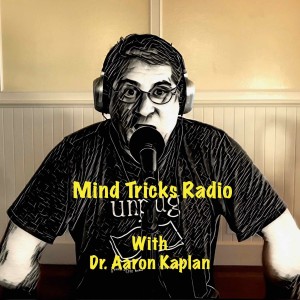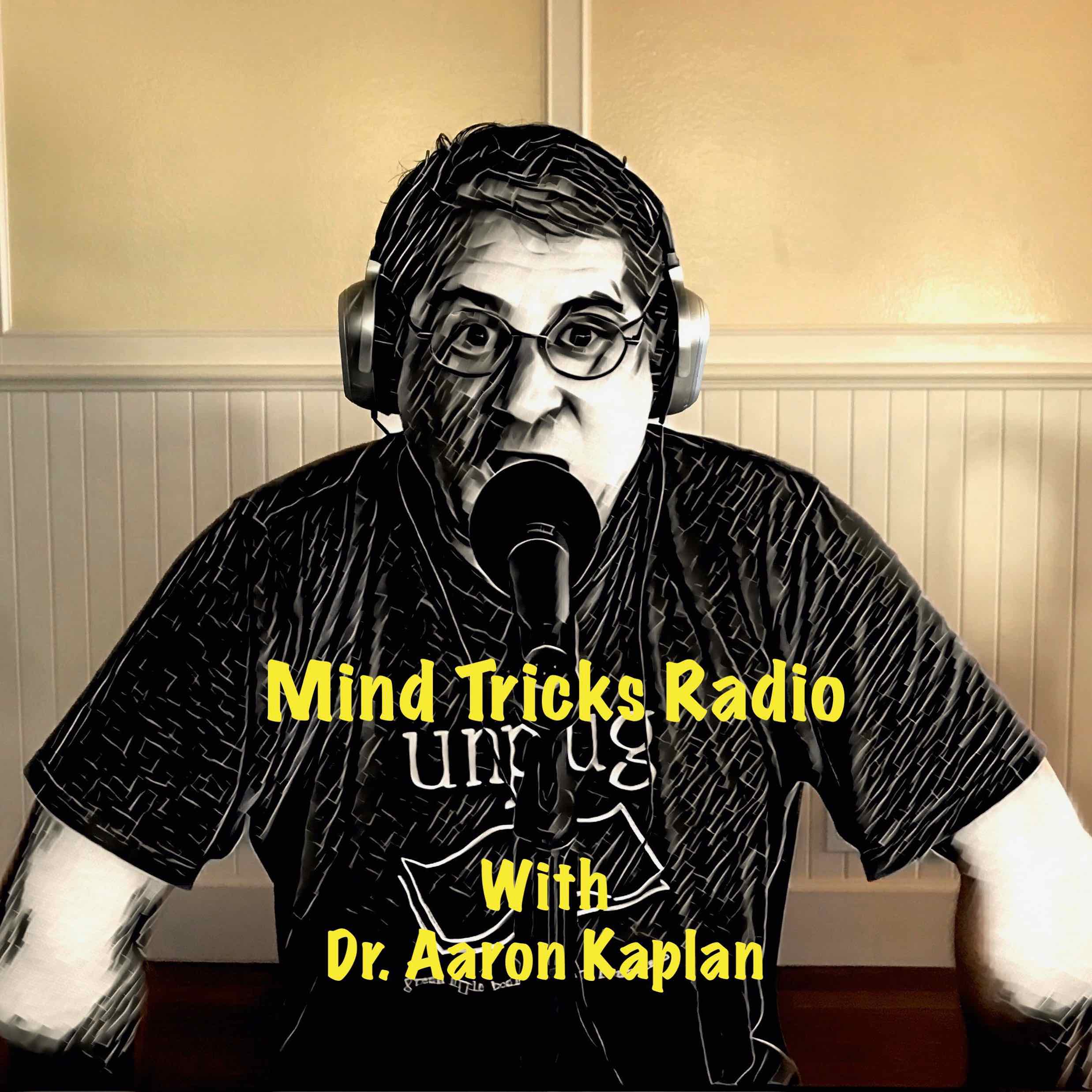Episodes

Thursday Nov 06, 2025
Episode 83: AI and the Future of Psychotherapy, with Dr. Nya Smith
Thursday Nov 06, 2025
Thursday Nov 06, 2025
In this episode of MindTricks Radio, Dr. Kaplan and Dr. Nya Smith dive into a lively and at times heated conversation about the future of artificial intelligence in psychotherapy. With Dr. Smith’s full consent, the discussion itself was generated through AI using cloned versions of both hosts’ voices. The episode takes a bold look at the rapidly changing landscape of mental health technology and challenges listeners to consider where AI fits in the world of human connection and healing.
Together, Dr. Kaplan and Dr. Smith explore some of the most provocative questions facing the field. Can AI simulate empathy well enough to support real therapeutic change? Where does simulated presence break down when compared to the felt, intuitive experience between two people? How should clinicians think about ethics, emotional nuance, and the potential for AI to reshape access to care? Their debate moves from the promise of AI supported CBT to the limits of deep relational work and the risks that emerge when technology begins to feel almost human.
This is a nuanced and evolving topic, one that is sure to stir strong feelings among therapists, technologists, and anyone curious about the future of mental health care. The conversation is candid, cordial, and intellectually charged. Whether you are excited about AI or deeply skeptical, this episode will leave you thinking about where we are headed and what role human connection should play in a world where our digital tools are becoming more emotionally convincing every day.
Be sure to check out my blog post and a full transcript of the episode on my website: https://waikikihealth.com/wp-admin/post.php?post=1228&action=edit

Monday Nov 03, 2025
Monday Nov 03, 2025
In today’s episode of MindTricks Radio, I sit down with veteran grief counselor and author Cynthia White to explore how children experience and heal from loss. Drawing from over four decades of work with grieving children and families, Cynthia shares her “quantum model” of grief—an approach that views grief as living energy in the body, best understood through movement, play, and connection.
Together, we unpack the differences between how children and adults grieve, the importance of honesty and safety in supporting young mourners, and the transformative power of allowing children to express emotion in their own way. Cynthia also reflects on the founding of Kids Hurt Too Hawaii, her years leading grief programs across the U.S. and Japan, and the universal human need to be seen, comforted, and believed in after loss.
This heartfelt conversation offers parents, teachers, and clinicians fresh insight into the world of childhood grief—and reminds us that sharing grief is, in itself, an act of love and strength.

Friday Oct 17, 2025
Friday Oct 17, 2025
In this episode of Mind Tricks Radio, I meet up with guest co-host Dr. Tyler Ralston for a fast-moving deep dive into one of the most recognize, and often misunderstood, diagnoses in mental health: PTSD. Together they trace its fascinating evolution from “shell shock” and “combat fatigue” to today’s broader understanding that trauma comes in many forms. Then they get practical, unpacking what really counts as trauma, what the four PTSD symptom clusters look like in real life, and how to tell PTSD apart from its close cousins: acute stress disorder, adjustment disorder, panic disorder, agoraphobia, depression, even OCD.
Whether you’re a clinician, a student, or just curious about why the word trauma seems to be everywhere, this episode will leave you smarter about how clinicians actually diagnose, and sometimes misdiagnose, post-traumatic stress.
Please find a Blog post and the full transcript of this episode at my website: https://waikikihealth.com/blog/

Saturday Oct 11, 2025
Saturday Oct 11, 2025
What happens in the brain when we step outside our cultural bubble? In this week’s episode of Mind Tricks Radio, I sit down with neuroscientist and science writer Dr. Aditi Subramaniam to explore how cross-cultural experiences literally reshape the mind. From creativity and cognitive flexibility to empathy and resilience, we dig into the neuroscience behind what happens when we immerse ourselves in unfamiliar languages, customs, and perspectives.
Dr. Subramaniam, who trained at the National Institute of Mental Health and Neurosciences in India and now works with the Neuroscience Education Institute, shares fascinating insights about how bilingualism sharpens cognition, how rituals act as “neural training,” and why diverse cultural exposure can reduce prejudice and expand empathy. It’s an engaging, hopeful conversation about what it means to stay mentally agile in an increasingly interconnected world.
Tune in for a lively blend of psychology, culture, and neuroscience, and discover why broadening your cultural horizons might be the best brain workout you’ll ever have.
Please see my Blog post and full transcript of the episode here, at my website:

Tuesday Oct 07, 2025
Tuesday Oct 07, 2025
Ever catch yourself thinking, “I feel anxious, so something must be wrong” or “I feel guilty, so I must’ve screwed up”? In this episode, Dr. Aaron and Dr. Tyler Ralston unpack the sneaky distortion known as emotional reasoning—the habit of mistaking feelings for facts. They dive into how anxiety, guilt, and anger can trick us into believing our emotions are evidence of truth, explore why our brains fall for it, and share practical tools to break the cycle. From everyday examples to mindfulness and cognitive reframing, this episode will help you learn to see emotions as data, not directives.

Friday Sep 26, 2025
Friday Sep 26, 2025
Today I had a blast interviewing Dr. Noam Shpancer on this episode of Mind Tricks Radio. We talked about his upcoming book, Mental Fitness 101: Principles for Psychological Well-Being, and the timeless psychological lessons he’s distilled from decades of research, teaching, and clinical work. Dr. Shpancer explained how good mental health rests on two fundamental human needs: the need to belong and the need to be. From there, he shared practical principles that can help anyone strengthen their psychological resilience—embracing knowledge and competence, honoring but not overvaluing experience, developing flexibility instead of rigidity, and learning to face fear directly rather than avoiding it.
What I loved most about this interview is how Dr. Shpancer makes these big ideas both accessible and immediately useful. He broke down how to manage emotions without being ruled by them, why we should treat our thoughts like “shoes in a store,” and how love, attachment, and even awareness of mortality can guide us toward a healthier and more meaningful life. Our conversation was both insightful and fun, with plenty of memorable examples and a few laughs along the way. If you’re looking for wisdom you can put into practice right now, this episode is a great place to start.
Please see my related Blog post and the Full Transcript of the episode here:
https://waikikihealth.com/ten-core-principles-for-psychological-well-being/

Friday Sep 12, 2025
Friday Sep 12, 2025
In this episode of Mind Tricks Radio, I sit down with Dr. Catherine Pittman, a psychologist, professor, and author of Taming Your Amygdala. We explore one of the brain’s most fascinating players: the amygdala. Sometimes called the brain’s “alarm system,” the amygdala is central to how we experience fear, anxiety, and even panic. Dr. Pittman brings warmth and clarity as she explains how this tiny almond-shaped structure drives the fight, flight, and freeze responses—and how understanding it can help us take back control when our emotions feel overwhelming.
Through engaging stories, science, and practical insights, Dr. Pittman breaks down why some people have more reactive amygdalas than others, how fear conditioning works, and what it means to truly “tame” this ancient part of the brain. She emphasizes that while our amygdala may be instinctual and automatic, it can also learn and adapt, giving us powerful tools for overcoming anxiety and reshaping old fear patterns.
Whether you’re a clinician, a student of psychology, or just someone who’s ever felt hijacked by worry, this conversation offers an accessible and encouraging guide to building a healthier relationship with your own amygdala.
Please check out my Blog post on this episode which contains an abridged transcript: https://waikikihealth.com/taming-the-amygd…atherine-pittman/

Monday Sep 01, 2025
Monday Sep 01, 2025
In this episode of Mind Tricks Radio, I sit down with clinical psychologist Dr. Patricia Zurita Ona to explore the concept of Playing It Safe Moves. Growing up in Bolivia during political unrest shaped her early understanding of fear, and her path from philosophy to psychology brings a rich, thoughtful lens to her work. We talk about Acceptance and Commitment Therapy (ACT), cognitive-behavioral tools, and her unique “Advisory Board” metaphor for understanding the chatter of our anxious minds.
Dr. Zurita explains how values-based living and mindfulness can transform the way we approach anxiety—from public speaking jitters to everyday worry. Instead of “playing it safe,” she shows how to take meaningful action even when discomfort shows up, and why aligning our choices with what matters most is the real path to growth. Engaging, insightful, and practical, this conversation offers a refreshing perspective on how to live more fully and how to challenge ourselves when we "play it safe."
A Blog Post and Full Transcript on this subject and the about my interview with Dr. Zurita Ona can be found on my website at: https://waikikihealth.com/how-we-use-playi…ope-with-anxiety/

Monday May 26, 2025
Episode 75: The Weaponizing of Therapy Speak, with Dr. Isabelle Morley
Monday May 26, 2025
Monday May 26, 2025
In this episode of Mind Tricks Radio, I sit down with clinical psychologist Dr. Isabelle Morley to talk about her eye-opening new book, They’re Not Gaslighting You. We dive into the world of “therapy speak” gone wild—how words like narcissist, toxic, gaslighting, and OCD are being thrown around on social media and in relationships, often in ways that do more harm than good. Dr. Morley unpacks the real meanings behind these terms, why accuracy matters, and how over-pathologizing can wreck our connections with others. We also chat about setting boundaries, the impact of armchair diagnosing, and what rom-coms get hilariously wrong about relationships. Smart, insightful, and seriously refreshing—this is one you don’t want to miss.
Blog post and full transcript at: https://waikikihealth.com/the-weaponizing-of-therapy-speak/

Friday May 16, 2025
Episode 74: Why We Believe Things That Aren’t True, with Dr. Joseph Pierre
Friday May 16, 2025
Friday May 16, 2025
I had a blast interviewing psychiatrist and author Dr. Joseph Pierre, who joined me to explore why false beliefs are so compelling—and so hard to shake. We dive into his book False: How Mistrust, Disinformation, and Motivated Reasoning Make Us Believe Things That Aren’t True, and talk delusions, the slippery boundary between pathology and normal belief, and how the internet, identity, and algorithms shape what we think is true. From cognitive biases to the power of repetition, and from free speech dilemmas to AI’s role in misinformation, this episode is a fast-paced tour through the psychology of belief—and what it takes to think critically in a post-truth world.

